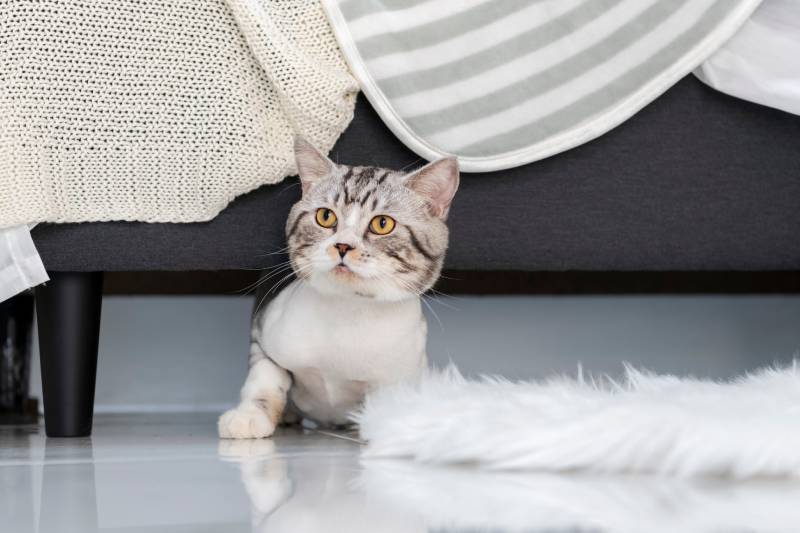Why Does My Cat Keep Going To The Litter Box But Nothing Happens?
Updated on
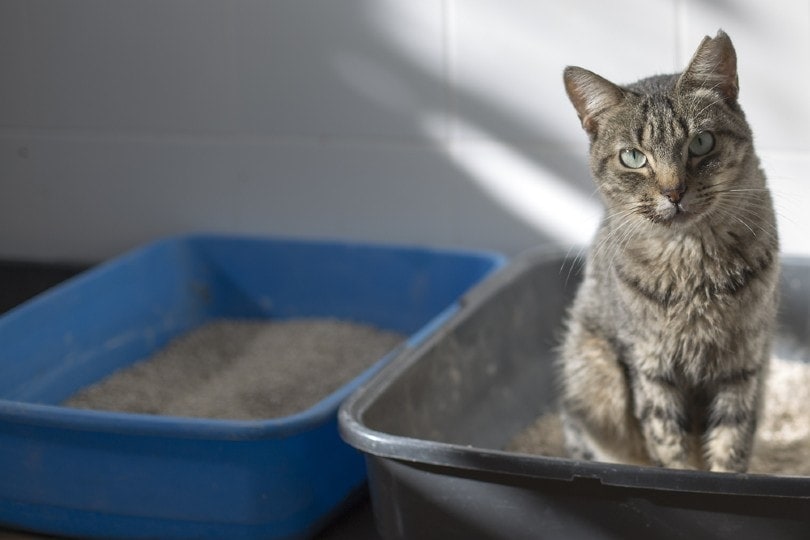
Unless your cat leaves a particularly smelly deposit, you probably don’t pay too much attention when they go to the litter box. Everybody poops, after all, and beyond your daily chore of box scooping, your cat’s litter habits just kind of blend into the background of life. Sometimes, however, your cat’s trips to the litter box might become a little less routine.
If your cat is making frequent trips to the litter box without anything happening, you might be wondering what’s happening and whether you should be worried. In fact, your cat’s unusual behavior could have several causes.
We’ll cover possible reasons for your kitty’s increased litter box visits in this article, including one that could be a life-threatening emergency. We’ll also let you know what you can do to make sure the behavior is corrected.
 5 Reasons For Unproductive Trips To The Litter Box
5 Reasons For Unproductive Trips To The Litter Box
1. Urinary Blockage
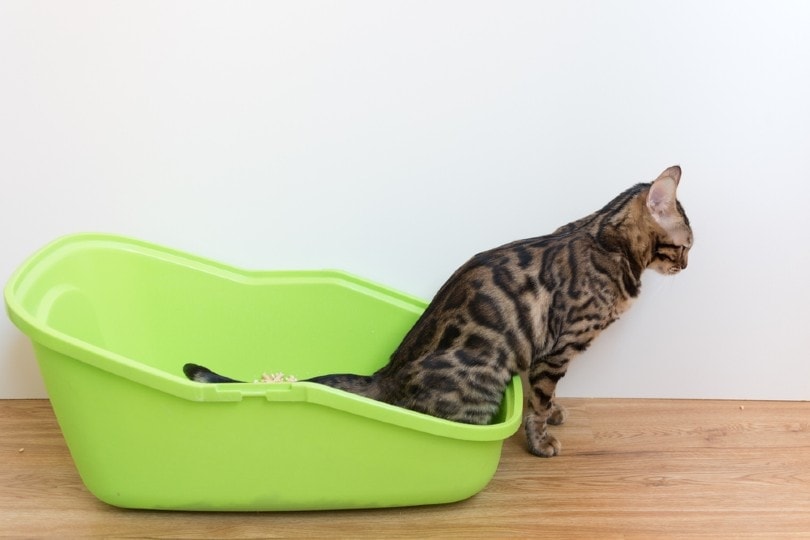
The most concerning reason your cat might be making frequent, unproductive trips to the litter box is that they are suffering from a urinary blockage.
Young, male cats are most at risk for this condition. Cats who are blocked are unable to pass urine at all but may enter the litter box frequently, straining and crying out in pain. You may also spot your cat squatting outside the litter box, attempting to pee.
If you aren’t sure whether your cat can urinate, or you haven’t seen them do so in the past 24 hours, this is an emergency and you should seek veterinary care immediately. Left untreated, a urinary blockage can result in dangerous electrolyte imbalances in your cat’s body, kidney failure, and bladder rupture. Complete obstruction can lead to death in 3–6 days.
2. Urinary Tract Infection
Sometimes, your cat may still be able to pass urine but makes frequent trips to the litter box because they have a urinary tract infection (UTI).
An infection can make urinating painful for your cat, causing them to pass only small amounts of urine at a time, requiring multiple trips to the box. If they are only peeing minimal amounts at a time, it may appear that nothing is happening when they go to the litter box.
Other signs that your cat could have a UTI include blood in the urine, strong-smelling urine, urinating outside of the litter box, and straining. Urinary tract infections can progress to more serious conditions including urinary blockage, kidney infection, or sepsis–infection in multiple body systems at the same time.
3. Constipation
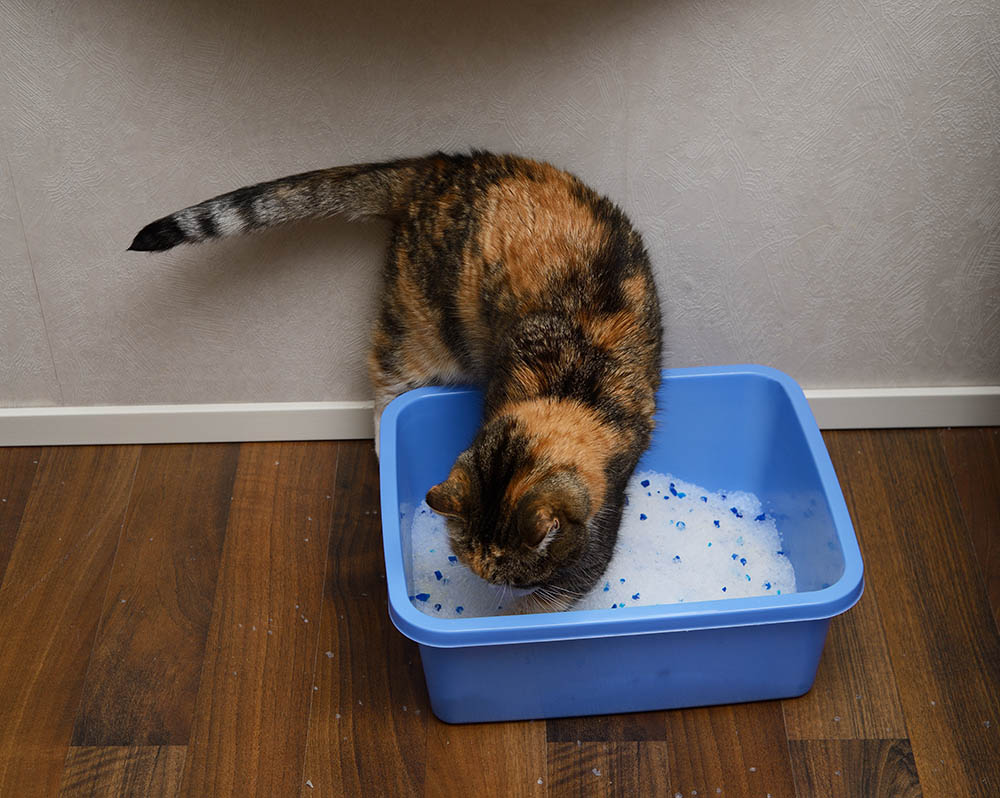
Another reason your cat could be frequenting the litter box unsuccessfully is that they are constipated.
Constipation is a condition where poop builds up in the cat’s colon and becomes impacted, or stuck because it gets dry and hard. When this occurs, your cat may struggle to poop, spending a lot of time in the litter box without anything happening.
Constipation can have many causes, but some risk factors include obesity and the age of your cat. Other symptoms you may notice if your cat is constipated are blood in the litter box, belly pain, bloating, lethargy, decreased appetite, and vomiting.
4. Diarrhea
Sometimes, the issue isn’t that your cat can’t poop but that they’ve already pooped so much there’s nothing left.
If your cat has diarrhea, it could appear that nothing is happening when they’re in the litter box because you’re catching them after they’ve already passed everything they could, but still have the urge to go. Check for diarrhea messes in other areas, including outside the litter box.
You may also spot other signs like an irritated or bloody rectum and messy fur on your cat’s rear. Diarrhea may be accompanied by other symptoms like vomiting or decreased appetite. Loose stool can have many causes, so it’s a good idea to call your vet for advice or an appointment.
5. Stress
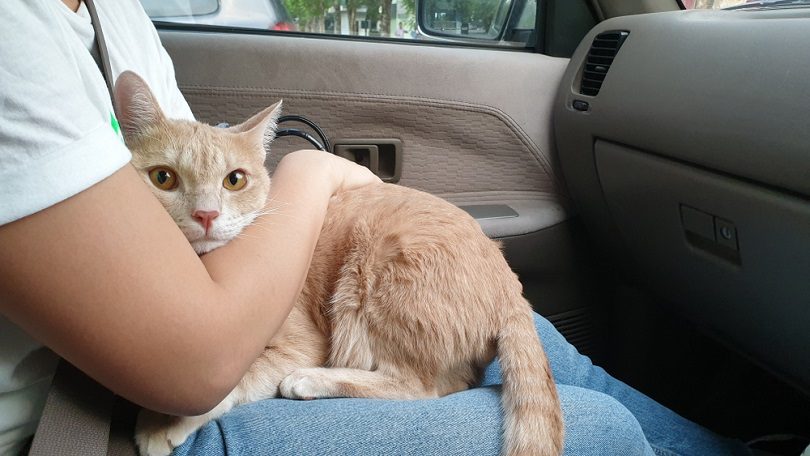
If you notice your cat spends long periods in the litter box not attempting to use it but just hanging out, it could be a sign of stress.
Veterinary staff often notice cats sleeping in their litter boxes when they’re in the hospital. Your cat may also stay in and around their litter box for several days after moving houses or if another major change occurs in the family.
The cat’s litter box smells like them, making it a safe and secure location in their minds. If your cat is suddenly spending a lot of time in the box without doing anything, consider whether something could be stressing them out.
What To Do If Your Cat Keeps Going To The Litter Box, But Nothing Happens
As we’ve learned, there could be several reasons for your cat’s repeated, unproductive litter box trips. Solving this problem depends on first learning the cause behind it.
The first step is to rule out a medical condition, especially if your cat is straining to urinate, by visiting a veterinarian. Your vet will examine your cat, ask you questions about what you’ve observed at home, and order diagnostic tests if needed. Once you have a diagnosis, it’s important to follow your veterinarian’s directions carefully regarding medications or follow-up appointments.
Once medical conditions are ruled out, it’s time to consider what could be stressing out your cat to cause their behavior. Common stressors for cats are a new baby, pet, or person joining the family. Cats can also become stressed by visitors, outdoor cats, or home improvement projects.
Help your cat feel more relaxed by giving them plenty of attention every day. Make sure you have enough beds, litter boxes, and toys at home, so your cat doesn’t feel like they need to compete with other pets. Consider using cat pheromone products to reduce stress as well. In severe cases, your vet may prescribe anti-anxiety medications for your cat.
 Conclusion
Conclusion
Cats are masters at hiding any signs of illness, and of course, they can’t speak to tell us what’s wrong. Part of being a cat owner is paying close attention to your kitty and not dismissing unusual behavior or signs that something isn’t right. It’s not normal for your cat to keep going to the litter box without anything happening, so don’t be afraid to voice concerns to your veterinarian. Your cat relies on you to ensure they get the care they need.
- Related Read: How To Retrain Cat To Use Litter Box: 7 Simple Steps
Featured Image Credit: Davynia, Shutterstock

 5 Reasons For Unproductive Trips To The Litter Box
5 Reasons For Unproductive Trips To The Litter Box

